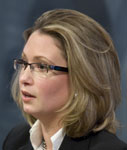Book Discussion: The Graying of the Great Powers: Demography and Geopolitics in the 21st Century
Demography is as close as social science comes to predicting the future, explains Neil Howe of CSIS, as he presents the geopolitical consequences of demographic trends over the next 50 years.
Overview
"The whole world is aging, and the developed countries are leading the way," said Neil Howe of the Center for Strategic and International Studies (CSIS) at a January 27, 2009, Wilson Center discussion of his latest report, The Graying of the Great Powers: Demography and Geopolitics in the 21st Century. Demography is as close as social science comes to predicting the future, Howe explained, presenting the geopolitical consequences of demographic trends over the next 50 years. Howe and co-author Richard Jackson, also of CSIS, were joined by Jennifer Sciubba of Rhodes College, who urged them and other demographers to explore how population trends interact with additional variables, such as environmental degradation, economic recession, and conflict.
Danger: Demographic Decline Approaching
"Populations in most developed countries will not only age, but stagnate or decline," due to falling fertility and rising longevity, said Howe. Without "sizable immigration," he warned, the populations of countries like the United States, France, Great Britain, Canada, Germany, and Japan will decline. As developed countries' populations shrink, they will lose military might, savings and investment, entrepreneurship, and cultural influence. "Voltaire once said that God is on the side of biggest battalions," Howe reminded the audience.
Developing Toward Greater Peace
 Jackson explained that the developing world is in the midst of the "demographic transition"—the drops in mortality and fertility that generally accompany economic and social development. Since 1970, the developing world's overall fertility rate has declined from 5.1 to 2.9 children per woman, and its overall population growth rate has dropped from 2.2 percent to 1.3 percent per year, according to Jackson. Additionally, the median age has risen from 20 to 26 years old, "a cause for hope and optimism about the future," Jackson argued, as countries with more balanced population age structures tend to be more democratic, prosperous, and peaceful than countries with extremely young ones.
Jackson explained that the developing world is in the midst of the "demographic transition"—the drops in mortality and fertility that generally accompany economic and social development. Since 1970, the developing world's overall fertility rate has declined from 5.1 to 2.9 children per woman, and its overall population growth rate has dropped from 2.2 percent to 1.3 percent per year, according to Jackson. Additionally, the median age has risen from 20 to 26 years old, "a cause for hope and optimism about the future," Jackson argued, as countries with more balanced population age structures tend to be more democratic, prosperous, and peaceful than countries with extremely young ones.
But despite the long-term possibility of a world transitioning toward greater peace and prosperity, the developing world will still experience near-term shocks. The timing and pace of the demographic transition varies widely by country and region, with some countries transitioning too fast or too far, said Jackson. These trends could push developing countries toward social collapse by acting "as a kind of multiplier on all the stresses of development," explained Jackson—for instance, causing China "to lurch even more toward neo-authoritarianism."
Crisis of the 2020s
Global demographic trends will converge in the 2020s to make that decade "very challenging," said Howe. The developed world will undergo hyper-aging, population decline, and flattening GDP growth, along with rising pension and health care costs, Jackson noted. The Muslim world will experience a decade of temporary youth bulges, as the large generation that was born between 1990 and 2000 has children. The populations of Russia and Eastern Europe will implode, and Russia's geopolitical strength and influence will wane. Meanwhile, China will experience a decade of "premature aging"; due to its one-child policy, it will become "gray" before it achieves the per capita GDP of most aging countries.
Demography and Public Policy
 Sciubba praised the report's comprehensive, policy-friendly approach to demography, but urged the authors to remain true to the nuances of their topic, even in their conclusions and recommendations. "Policymakers like to know what we don't know and what we do know. And with population aging and national security, often there's a lot more of what we don't know than what we do know," she said. "Going into the future, we need more of an emphasis on places where policymakers can make a difference," said Sciubba. "Opportunities matter just as much as challenges."
Sciubba praised the report's comprehensive, policy-friendly approach to demography, but urged the authors to remain true to the nuances of their topic, even in their conclusions and recommendations. "Policymakers like to know what we don't know and what we do know. And with population aging and national security, often there's a lot more of what we don't know than what we do know," she said. "Going into the future, we need more of an emphasis on places where policymakers can make a difference," said Sciubba. "Opportunities matter just as much as challenges."
Drafted by Will Rogers and edited by Rachel Weisshaar.
Documents & Downloads
- Book Discussion: The Graying of the Great Powers: Demography and Geopolitics in the 21st CenturyDownload
- Book Discussion: The Graying of the Great Powers: Demography and Geopolitics in the 21st CenturyDownload
- Book Discussion: The Graying of the Great Powers: Demography and Geopolitics in the 21st CenturyDownload
- Book Discussion: The Graying of the Great Powers: Demography and Geopolitics in the 21st CenturyDownload
- Book Discussion: The Graying of the Great Powers: Demography and Geopolitics in the 21st CenturyDownload
- Book Discussion: The Graying of the Great Powers: Demography and Geopolitics in the 21st CenturyDownload
Speakers
Hosted By

Environmental Change and Security Program
The Environmental Change and Security Program (ECSP) explores the connections between environmental change, health, and population dynamics and their links to conflict, human insecurity, and foreign policy. Read more
Thank you for your interest in this event. Please send any feedback or questions to our Events staff.











